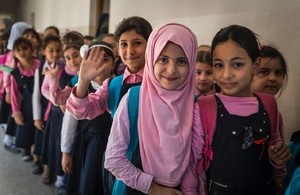Minister for the Middle East announces new UK aid package to help Iraq rebuild infrastructure and boost economy
New support to rebuild hospitals, schools and other vital infrastructure, allowing Iraqis displaced by conflict to return home and restart their lives.

Iraqi girls at a school in Mosul. 38 schools have been rehabilitated with UK funds, 28 of which are in Mosul. Picture: UNDP
A new UK aid package is to help the Government of Iraq to reinvigorate its economy and rebuild hospitals, schools and other vital infrastructure, allowing Iraqis displaced by conflict to return home and restart their lives, UK Minister for the Middle East Alistair Burt announced during a four-day visit to Iraq.
The UK is the first donor to the newly formed Iraq Reform and Reconstruction Fund (IRRF), following close cooperation between the Department for International Development (DFID), the Government of Iraq, the World Bank, Germany and other international partners to develop the fund.
The fund will:
- encourage innovative approaches and provide technical assistance to the Government of Iraq as it reconstructs areas affected by conflict, including the rebuilding of houses, schools, hospitals, factories and roads.
- provide opportunities to utilise UK and international expertise to help the Government of Iraq to carry out vital reforms that will make the country more business friendly.
- help unlock Iraq’s economic potential, generate jobs, boost potential for enhanced future trade with the UK and other international partners and lay the ground-work for long-term peace and stability following the conflict with Daesh.
In addition to tackling Iraq’s long-term recovery and reconstruction, Mr. Burt also announced further support to help meet the immediate humanitarian needs of the 1.8 million people still displaced from their homes within Iraq, and a boost for stabilisation efforts to ensure vital services such as healthcare and electricity are reinstated quickly in places such as Mosul.
During the visit in which Iraq and the UK agreed to a joint communique to further strengthen bilateral relations, Mr Burt held wide ranging discussions on UK-Iraqi cooperation, trade, development and regional security issues with the Iraqi President Barham Salih, the Prime Minister Adil Abdul Mehdi, Foreign Minister, Deputy Foreign Minister and the Trade and Planning ministers.
He also met Prime Minister of the Kurdistan Regional Government, Nechirvan Barzani, and the Prime-Minister designate, Masrour Barzani. Whilst in the Kurdistan Region, the minister also met Minister for the Interior, and for Peshmerga Affairs Karim Sinjari, as well as Deputy Prime Minister Qubad Talabani.
In support of the Foreign Secretary’s commitment to tackle the persecution of Christians across the globe, the minister also engaged with the Archbishop of Erbil, Bashar Warda and grassroots faith organisations to gain their perspectives on freedom of religion and beliefs in the region.
Speaking from Baghdad the Minister for the Middle East Alistair Burt said:
The UK is a strong partner and friend of Iraq. We share a range of mutual and growing priorities which include security, development, foreign policy and trade.
There is much to be celebrated about Iraq’s progress since the territorial defeat of Daesh in 2017. But there is more to be done to help Iraq develop the strong, stable future, decided on by all Iraqis, that its people deserve. The UK remains committed to supporting Iraq to develop along non-sectarian lines, and we are particularly concerned about the rights and freedoms afforded to Christians and other minority faith groups.
I am proud that we will be the first donor to the Iraq Reform and Reconstruction Fund. UK aid will provide vital support to the people of Iraq as they rebuild their lives, their businesses and their economic independence.
UK aid announced today for the humanitarian response will support vulnerable people displaced by conflict, providing clean water, medicine and shelter. Since 2014, UK aid in Iraq has provided 4.1 million people with life-saving healthcare, 2 million people with safe water and sanitation, 836,500 people with shelter and more than 408,000 people with food.
Notes to editors
- £16 million will be allocated to the Iraq Reform and Reconstruction Fund (IRRF), run by the World Bank, from DFID’s budget. The IRRF will support Government of Iraq-led reconstruction efforts following the destruction caused by the conflict with Daesh, and support the implementation of longer term economic reform.
- £6.9 million will be allocated to UNDP’s Funding Facility for Stabilisation in Iraq from the UK Government’s Conflict, Security and Stability Fund (CSSF). It will directly support the rehabilitation of critical infrastructure in areas of Iraq liberated from Daesh. This will include hospitals, school, power plants and roads destroyed in the fighting.
- £10 million will be allocated to UN OCHA’s Iraq Humanitarian Pooled Fund from DFID’s budget. It will support the ongoing humanitarian response, providing for the immediate needs of vulnerable people in Iraq displaced by conflict. It will help deliver clean water, medicine, shelter and a wide range of additional services to people living within temporary camps. Since 2014, UK aid in Iraq has provided 4.1 million people with life-saving healthcare, 2 million people with safe water and sanitation, 836,500 people with shelter and more than 408,000 people with food.
- UK aid has provided £252.5 million in humanitarian support and over £103 million in stabilisation funding to the people of Iraq since 2014.
- In 2018, the Foreign Secretary announced a review into the persecution of Christians in the Middle East, led by the Bishop of Truro.
- Globally, around 215 million Christians face persecution, and the population of Christians in the Middle East has declined from 20% to 5% over the last century.
- Exports of goods and services from the UK to Iraq are increasing and reached £0.5bn in 2017, which was a 10% increase on the year before.
ENDS
General media queries (24 hours)
Email [email protected]
Telephone 020 7023 0600
If you have an urgent media query, please email the DFID Media Team on [email protected] in the first instance and we will respond as soon as possible.